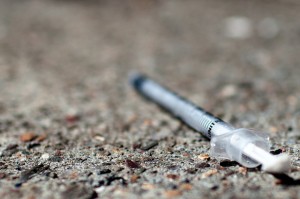D.C. Needle Exchange: What a Budget Axe Could Have Done
D.C. needle exchange providers are breathing a collective sigh of relief after news broke yesterday that the impending temporary budget bill wouldn’t cut their funding after all.
But the possible loss of such funding spurred us to ask: how do needle exchanges work, anyway and who would be most affected if such a cut went through?
A few organizations in the District run needle exchange programs, including Helping Individual Prostitutes Service (HIPS), which works with commercial and informal sex workers in the District. Executive director Cyndee Clay says her group works with about 1,000 people a year, exchanged 8,000 syringes in March and about 65,000 in 2010.
Different providers handle needle exchange differently. For HIPS, clients register and then can exchange dirty needles for an equal number of sterile ones. In addition to the exchange, HIPS workers often take the opportunity to provide health counseling and other drug intervention services.
The majority of clients are African Americans and they are about evenly divided among women, men and transgender men and women, says Clay.
“These populations often never go through the door of a social agency, so those people would effectively be cut off from any services except for law enforcement” if needle exchanges ceased, Clay says.
All of this is of particular concern in the District, which has the country’s highest HIV-infection rate. Public health advocates have long boasted that needle exchanges are among the most effective ways to reduce infections, says William McColl, political director for AIDS United.
“Once you’ve prevented one case of HIV, you’ve prevented all other future cases from them,” McColl says.
Public funding for needle exchanges in the District is relatively new: the federal ban on funding was only lifted in 2007. But now needle exchange programs have a bigger burden to bear after PreventionWorks!, long the needle exchange program in town, had to close this year for lack of money.
HIPS receives about $125,000 from the District for its syringe access program, constituting 80 percent of its needle exchange funding. So the prospect of such a cut made Clay “just livid.”
“It’s just infuriating. This is our budget. Especially syringe exchanges, this has the support of our local government and our local health department,” Clay says.





